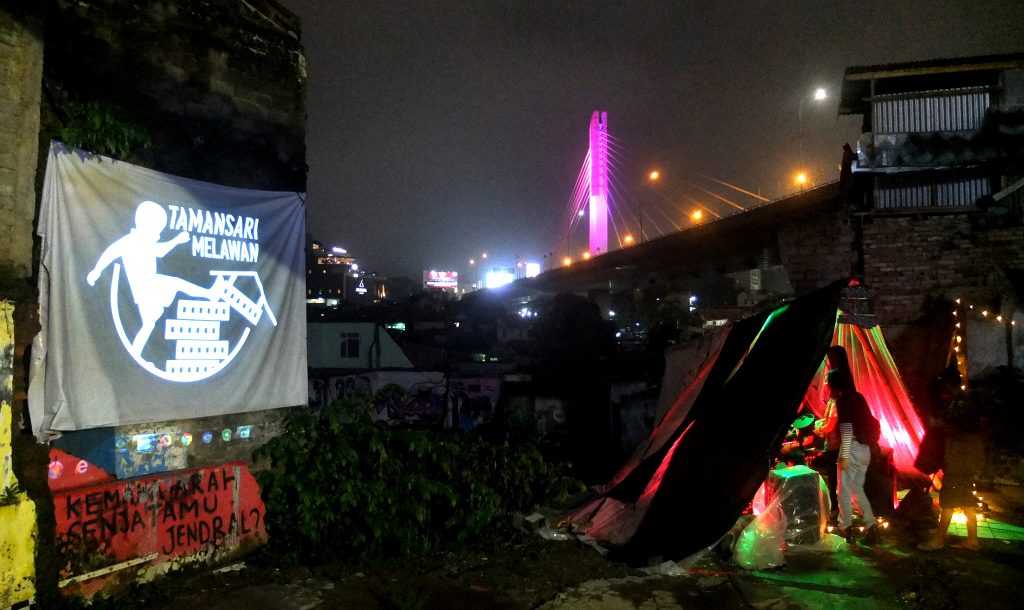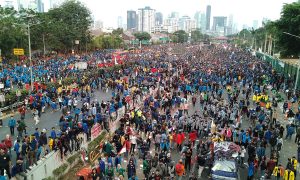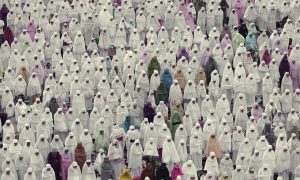In 2019, brutal evictions took place in Kampung Tamansari in Bandung, West Java. Carried out by police, military, and para-military groups on the orders of the city authorities, the action included violent evictions, the burning of houses, firing of tear gas, and the arrest of activists. But the spectacular violence of the eviction meant that images went viral on social media, sparking outrage among the Bandung public, and also gaining national and even international attention. The people of Bandung have joined the Tamansari residents in asking: why is the government stealing their land? Why isn’t there a development policy that doesn’t destroy people’s lives?
Over the past few years, Bandung, the capital of West Java in Indonesia, has been dramatically transformed through a program of rapid urban development, which has also intensified conflicts over land and urban rights. The former mayor of Bandung, Ridwan Kamil (2013-2018) now governor of West Java, who has an architectural background, promoted an approach to urban development that was imagined as a beautification of the city, making it smart, creative, clean, and modern. However, this developmental thinking was misguided, and its imposition had a devastating impact on the status of land and the rhythm of life in urban kampung.
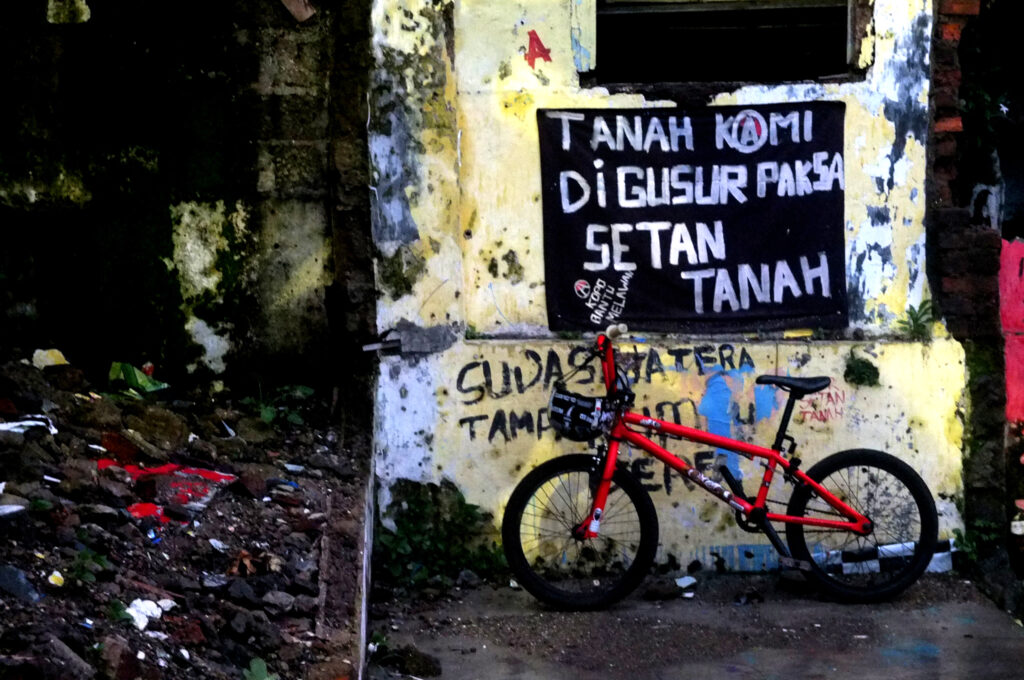
Posters at the site of the eviction read “Our land. Forced eviction by land demons.” Photograph by the author.
Using architectural design and city development templates packaged in terms of the ‘Smart City’ and ‘Creative City’, this was mainly a political branding exercise. In practice Kamil’s urban development helped to support a boom in commercial property construction, displacing and grabbing land from many poor, peri-urban communities and sparking an upsurge in anti-eviction and ecological struggles. The Bandung city government is eyeing areas with low security of land tenure in order to obtain land cheaply, or even for free. Urban kampung that are strategically located and have high commercial value have become the main targets of this regime of urban beautification and gentrification. This is a story of one of the four urban kampung that were wiped from the map of Bandung under Mayor Ridwan Kamil.
Kampung Tamansari
Under the logic of development, the very existence of urban kampung dwellers and their houses is stigmatized, so these communities are targeted for replacement by newly built rumah deret (flats). However, kampung communities are fighting back against their displacement. Kampung Tamansari in Bandung provides an illustrative case. Tamansari residents assert their right to inhabit state-owned land in downtown Bandung on which their houses are built, but these rights have not been recognized by the city government. Instead, they were subjected to a false consultation process in which the result was pre-determined; during Ramadan in 2017, Tamansari residents were first invited to an iftar meal at the Mayor’s official residence, and then this was turned into a supposed “public consultation” process after which residents were declared to have agreed to the demolition of their homes as part of the rumah deret building program to be implemented by the developer. After seeing the design, residents had questions. “How can this be called rumah deret for urban poor? It’s a luxury apartment block with dozens of floors, it’s not for us.” They perceived that the city government only wanted to acquire this land for developers, by displacing and stigmatising them.
Tamansari residents asserted their legal status as citizens, with Indonesian Identity Cards (KTP – Kartu Tanda Penduduk). They live on free state land, for which title rights have not been legally assigned to anyone by the National Land Agency (BPN – Badan Pertanahan Nasional). Residents can lay claim to the land through the Indonesian Agrarian Law of 1960, under which residents who occupy and manage unclaimed land are entitled to claim legal tenure and be granted certification by the BPN. Surrounding communities have successfully claimed such rights but, strangely, Tamansari residents have been repeatedly thwarted by BPN and local government officials when they have applied. In fact, BPN has never issued a land certificate granting ownership to the City Government, which only started to claim the land as a government asset in 2017, in a publication of the City Financial and Asset Agency (BPKA – Badan Pengelolaan Keuangan dan Aset). This just so happens to coincide with the proposed rumah deret development plan.
What then is the legal force that underlies BPKA’s claim? Their claim is based on a sale and purchase agreement made in the 1930s by Gementee (Kotapraja/colonial government city), when Indonesia was still colonised by the Netherlands. The colonial agrarian system changed along with the shift to a new Indonesian state system, which was then regulated through the Agrarian Law of 1960. Under the 1960 law, if land rights were registered before 1980, the land belongs to the state. Citizens, subnational and municipal governments, cooperatives and companies have varying rights to state land under the Agrarian Law, which can only be asserted through application to the BPN.
This demonstrates a failure of the bureaucratic system regarding land status in Indonesia, and the government will continue to take advantage of the resulting uncertainties in order to deceive citizens and commit land grabbing. But Tamansari legally remains state land, until the legal process is complete and land rights granted.
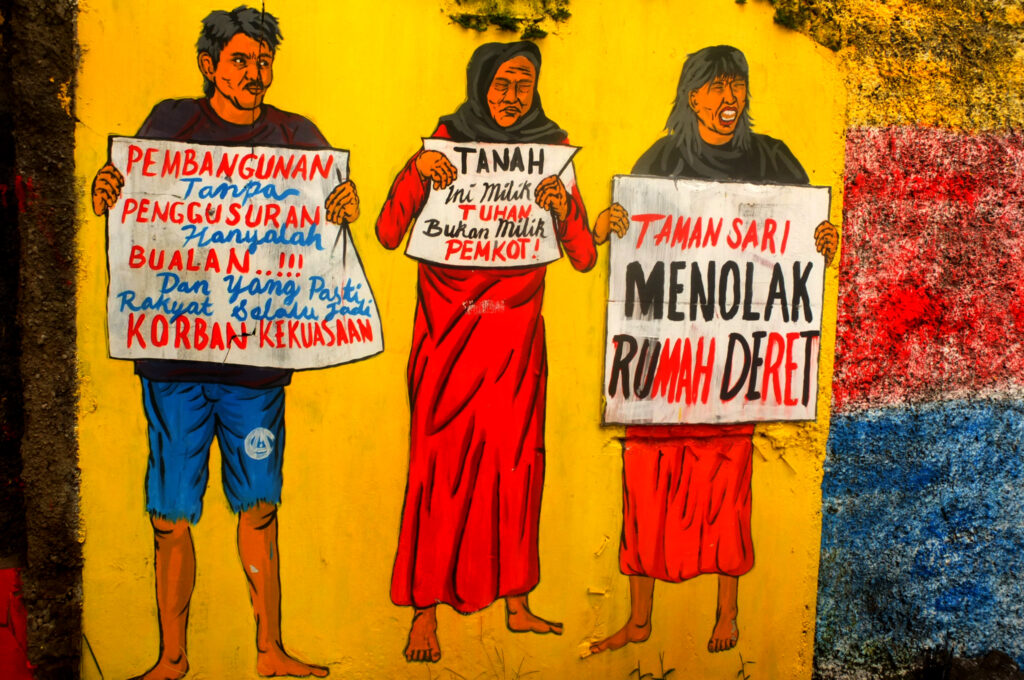
Murals declare Tamansari residents’ rejection of the new development. Photograph by the author.
In Indonesia, urban kampung are stigmatized as slum areas, and this has been applied to Kampung Tamansari. The Bandung City Government does not have a standard system for categorizing a neighbourhood as a slum, using criteria that vary from place to place. The government does not act to protect or support poorer city residents; instead, they stigmatize and marginalize them. “Slum” is a powerful form of class framing, evoking many myths about the urban poor and implying that those labelled “slum-dwellers” deserve to be evicted.
The Bandung city government acts as a bureaucratic capitalist, promising a dream of beautiful and comfortable housing, but serving investors and not citizens. Applying the label “slum” to urban kampung is their way of seizing people’s living space in the interests of developer capital. It is true that perhaps around 5% of dwellings in Kampung Tamansari are of poor quality and unsuitable for habitation. The rest are permanent, tiled houses, with good sanitation and water access. Almost half of these have two stories. The mayor and government have claimed that any dwelling with three or more families living in it is an uninhabitable “slum” dwelling. The same criteria are not applied to dwellings families in middle-class or less central suburbs – the label is in fact related to land use, demand and prices in the inner city.
The city government has claimed that as part of the relocation scheme a household with three families will instead be given three separate rental flats, but this framing of “one family – one house” is a simplification which does not fit with the social preferences or lifestyles of most Indonesians. Furthermore, the plan is for residents to be relocated to flat in Rancacili area, 30 km from Kampung Tamansari. Tamansari residents have not been given any assurances regarding support or reasonable compensation for transportation costs, school transfers, or the disruption of their livelihoods. Most Tamansari residents work in the informal sector and so are reliant on their knowledge of and connections in the local area. The residents who initially agreed to the relocation scheme, including one year’s worth of rent amounting to IDR 26 million, have become increasingly wary. The apartments are not yet ready to build, and it is not easy to find rental accommodation in downtown Bandung, near Tamansari, with annual rent as low as IDR 26 million (USD $1800-1900). One resident who refused a rumah deret and relocation, died in the Al-Islam mosque beside the eviction area several days after the eviction. The new housing project had yet to be realized even though resident’s own houses had already been demolished, and government assistance was uncertain and increasingly limited.
The status of the rumah deret building project remains unclear; as yet there has been no land certification and no environmental impact analysis (AMDAL – Analisis dampak Lingkungan) which is the main basis for issuing a building permit (IMB – Ijin Mendirikan Bangunan) for the construction of public infrastructure. The surviving residents launched a lawsuit based on the lack of AMDAL on December 16, 2017 with the support of Legal Aid, but the forced eviction that occurred indicates that the Bandung City Government does not respect the legal system in force in Indonesia.Eviction efforts were carried out from 2018 and peaked on December 12, 2019, even though the court’s decision was only issued on December 19, 2019. Currently the residents’ case is under appeal at a higher court level.
In addition, since 2017 state agencies such as KomnasHAM (the National Human Rights Commission), the Ombudsman Commission, and the Development Commission of the People’s Representative Assembly of Bandung (Komisi C – Dewan Perwakilan Rakyat Daerah Kota Bandung) have given notice to the Bandung City Government to respect the legal process, uphold human rights and good governance.
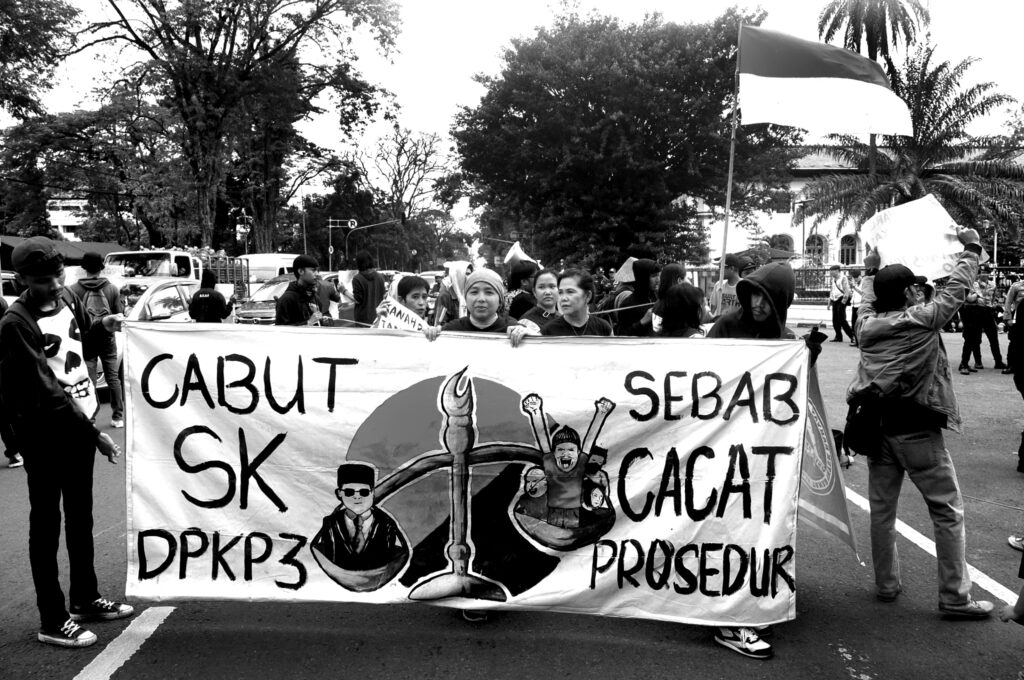
Protestors against land grabbing in Bandung are drawn from diverse backgrounds. Photograph courtesy of the author.
There has been no official agreement that guarantees that displaced Tamansari residents will be provided with an apartment in the new development if they are eventually built. This has all relied on verbal assurances from Mayor Ridwan Kamil, demonstrating a lack of seriousness on the part of Ridwan Kamil and the municipal government to respect the rights of citizens of Kampung Tamansari. The project has not been included in the 2011-2031 city plan.
Resistance
Since 2017, residents have remained in the Tamansari neighbourhood in order to block the evictions. Community resistance and solidarity has been organized through an urban civil movement named ARAP (Aliansi Rakyat Anti Penggusuran – People’s Alliance Against Eviction). The citizens in many urban kampung areas in Bandung joined ARAP out of solidarity and considered themselves vulnerable to eviction and land grabbing.
This movement is not only a political movement, but also a cultural movement. ARAP is made up of local residents, musicians, artists, activists, public lawyers, independent journalists, and also members of allied groups such as Perpustakaan Jalanan Networks, Bandung Student Collective, the football fans of the Bandung Supporters Alliance, the anarchist collective KolektivA, members of punk collectives, and NGOs such as AJI (Alliance of Independent Journalists), WALHI West Java (Indonesian Forum for Environment and ARC (Agrarian Research Centre). They have come together to raise awareness of and support for the anti-eviction struggle in Tamansari, promoted as #TamansariMelawan.
People, politics and planning collide in riverside slum Kampung Pulo.
Floods and forced evictions in Jakarta
In 2018, Bandung hosted the Global Land Forum (GLF), a meeting intended to create and coordinate land policies and large-scale land control regulations at the global, national, and local level, which have been formulated in neoliberal terms by global financial organizations and landed interests. It is perhaps no surprise that the GLF attracted protests by those living in Bandung who have been affected by the marketization and financialization of land, and related processes of gentrification and slum clearances. With the support of ARAP, the residents of Tamansari will continue their struggle for just, legal and equitable land rights.
 Facebook
Facebook  Twitter
Twitter  Soundcloud
Soundcloud  Youtube
Youtube  Rss
Rss 